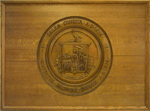Glass House Field: Difference between revisions
No edit summary |
No edit summary |
||
| Line 18: | Line 18: | ||
*[http://innopac.noblenet.org/search?/tsalem+in+the+17th+century/tsalem+in+the+++17th+century/-3%2C0%2C0%2CB/frameset&FF=tsalem+in+the+seventeenth+century&1%2C1%2C/indexsort=- Salem in the Seventeenth Century] by J.D.Phillips, p.155, 177, 99 | *[http://innopac.noblenet.org/search?/tsalem+in+the+17th+century/tsalem+in+the+++17th+century/-3%2C0%2C0%2CB/frameset&FF=tsalem+in+the+seventeenth+century&1%2C1%2C/indexsort=- Salem in the Seventeenth Century] by J.D.Phillips, p.155, 177, 99 | ||
*[http://innopac.noblenet.org/record=b2172069~S24 Salem in the Seventeenth Century] by J. D. Phillips, p. 155, 177, 99 | |||
Revision as of 10:27, 9 September 2011
Salem had one of the oldest glass works in the area. Town records show that in 1638, a Obadiah Hullme was granted one acre of land for a house near to the "glasse house". This glass house was located in a field now lying between Boston and Aborn streets, where glass slag has been plowed up there. Some of the products were bottles, and coarse articles of inferior glass and probably window glass. One of the leading makers of glass was Ananias Conkclin who established the business of glass making here, finishing his building before the end of 1638. He was later joined in the business by Obadiah Holmes (Hullme) and Lawrence Southwick. Some sort of company was formed, but they did not fare well. Holmes and Southwick had dropped out of the business by 1642. The colony loaned Conkclin 8 pounds to continue on, to be repaid after the next Indian corn harvest.
See Also
- The History of Salem, Massachusetts by Sidney Perley, Vol. 2, p. 53 (photo included)
- Historical Sketch of Salem by Chas. Osgood, p. 260
- Essex Institute Historical Collection Vol. 16, p. 1
- Salem in the Seventeenth Century by J.D.Phillips, p.155, 177, 99
- Salem in the Seventeenth Century by J. D. Phillips, p. 155, 177, 99
